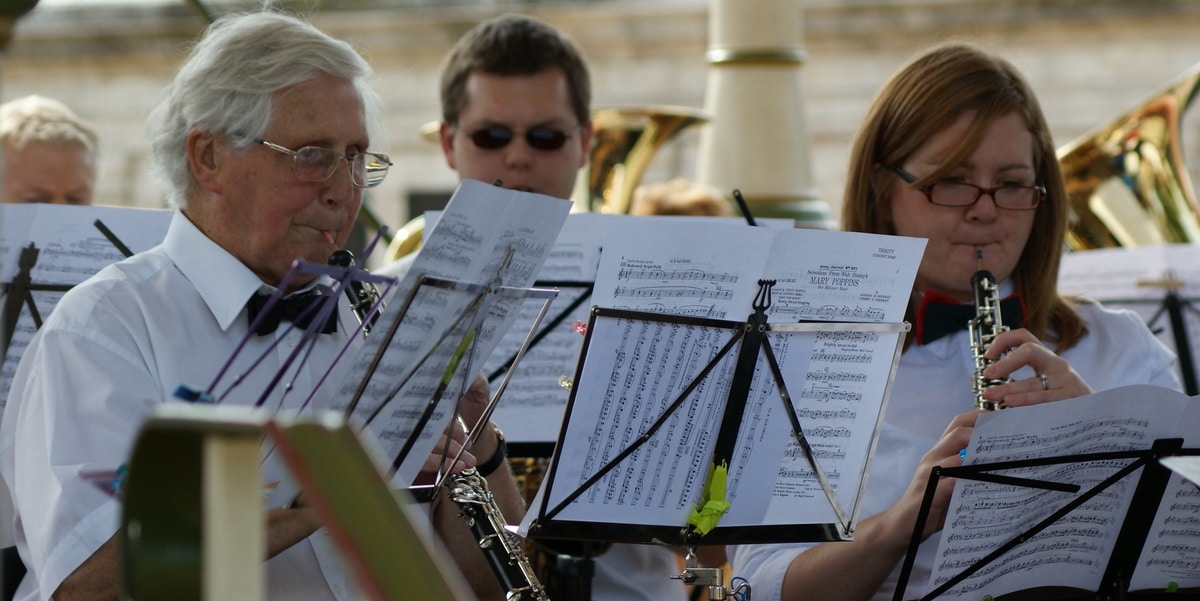Scales. A dreaded word by many young musicians. I used to share the same repulsion when I thought of oboe scales.
Nevertheless, they are extremely important to both the developing and advanced musician.
Let's talk about why scales are vital to all players, so that you can at least understand and maybe even appreciate their importance.
Warm Up with Scales
Scales, along with long tones, are the perfect way to start your practice sessions.
Scales provide a blank canvas that can be added onto to fit the needs of the technical skill you are working on.
For example, my recent use of scales has been to increase my tonguing speed. In addition, I have also been working on oboe etudes that require an agile tongue.
The combination of the two together is helping me to reach my goal of being able to tongue faster.
In fact, my work on scales helped me to identify the tongue placement I have been using on the reed. I was not using the part of my tongue that would make my tonguing speed more efficient.
Without scales, I wouldn't have identified that problem.
Another wonderful use of scales is to work on rhythm. You can adjust what rhythms you play scales on, so that you get more comfortable playing them.
You might want to even out your tonguing on eighth notes, so you could play two eighth notes on each note of the scale as a basis to asses yourself.
After a while of playing, you shouldn't have to think about what notes to play in a scale. It becomes a sort of mindless activity, which is why it provides a perfect base to work on other things.
When you focus your warmup time on these skills, it makes it so that you can focus on playing actual music when you are in that part of your practice session.
Also, your previous work will be able to help you identify how to fix things later on in your practice session.
Recognize Keys
Scales give you the basic understanding of keys that are used in music, which is helpful knowledge to have.
Your band director may have the band warm up on a Bb Scale to get the ensemble in the right headspace for a piece that is in Bb.
The same thing should be the case for your practice sessions. I would recommend rotating through all scales.
If you do this, you will become much more confident playing in any key. You will also become a much better leader in an ensemble setting because of knowing your scales.
For beginners, maybe just rotate through the keys that you are playing in band or in pieces that you are playing for private lessons.
Specifically for woodwinds, scales prepare you for runs in pieces.
For example, I once played in a pit orchestra for The Wizard of Oz, which is notorious for its woodwind flourishes.
I was extremely thankful that I practiced my scales rigorously, because I could just write directly above a run what scale to think of instead of just seeing a bunch of random notes.
Even Out Tone and Build Air Support
I like to use scales to center myself before playing more challenging pieces of music.
Like longtones, scales strip things down to the bare bones, which allows you to focus on very specific parts of playing the oboe.
Evening out the tones across all registers and building air support are two of my favorite parts to build on with scales.
The two are greatly connected, as you need to learn what airspeed is needed in each register.
To work on this, I like to do a scale in half notes completely slurred. You don't have any extra variables like tonguing this way.
Work on Dynamics
To go with the theme above, using the slurred scale you can work on dynamics. That base is really great for these things as well.
I find that creating a long phrase, increasing your dynamic level upward and then decreasing while going downward helps with gradual dynamic shifts.
It also helps with the building of air support that was mentioned above.
You can also just choose to do an entire scale at the same dynamic level. I would repeat the same scale a number of times at different dynamics, so that you can get more comfortable playing at any dynamic level.
Vibrato Work
Vibrato is yet another thing that you can use scales as a blank canvas.
By keeping all other variables consistent, you can choose to do a scale without vibrato and then repeat it while using vibrato.
You can also choose to "pulse" certain rhythms to gain control over your vibrato.
To do this, play a scale in half notes. Pulse your vibrato in quarter notes, then repeat with eighth notes, then triplets, etc.
Again, this blank canvas can turn into a great tool to work on very specific and important skills.
Work on Reeds
I like to use my time on scales to also work on adjusting oboe reeds.
There is noting that I hate more than stopping in the middle of an etude or solo portion of my practice session to work on reeds.
I also found that my skills as a reedmaker improved greatly when I started building in reedmaking time into my everyday practice.
When you are learning how to make oboe reeds, it can be challenging to know what to do let alone having the courage to actually go and adjust your own reeds.
The only way to get better is to practice. Trust me, you will ruin plenty of reeds as you build your skills.
There is no better teaching tool than a ruined reed!
Closing Thoughts
After a while of really incorporating scales into my practice routine, they became a centering practice.
I would come home after a stressful day of school and practice to practice oboe, and scales became a way to zone out and get away from the stressors of everyday life.
I grew to appreciate the importance of scales once I started using them to work on technical aspects of playing as well.
Just like any athlete, you have to work on the fundamentals like dribbling, so that you will be best prepared for the game.





